Index: Understanding Keyword Research
- Understanding Keyword Research
- What is Keyword Research?
- Importance of Keyword Research for SEO
- Finding Keyword Ideas
- Brainstorming “Seed” Keywords
- Analyzing Competitor Keywords
- Utilizing Keyword Research Tools
- Exploring Niche-Specific Keywords
- Analyzing Keywords
- Understanding Search Volume
- Assessing Traffic Potential
- Evaluating Keyword Difficulty
- Considering Cost Per Click (CPC)
- Targeting Keywords
- Identifying Parent Topics
- Analyzing Search Intent
- Prioritizing Keywords
- Identifying Low-Hanging Fruit
- Assessing Business Potential
- Establishing Priority Keywords
- Advanced Keyword Research Tips
- Leveraging Semantic Keywords
- Anticipating Keyword Trends
- Essential Keyword Research Tools
- Google Keyword Planner
- SERP Gap Analyzer
- Google Search Console
- Google Trends
- Other Recommended Tools
- Tracking and Improving Keyword Performance
- Utilizing Rank Tracking Tools
- Monitoring Keyword Performance Metrics
- Additional Resources
- Related Articles and Resources
- Tips for Effective Keyword Research
Keyword Research Demystified: A Comprehensive Guide
1. Understanding Keyword Research
Keyword research lies at the heart of every successful SEO strategy, serving as the compass that guides businesses toward their digital objectives. By unraveling the intricacies of keyword research, businesses can unearth valuable insights into their target audience’s behavior and preferences, paving the way for enhanced online visibility and engagement.
What is Keyword Research?
At its core, keyword research involves the systematic process of identifying and analyzing the terms and phrases that users input into search engines when seeking information, products, or services relevant to their queries. These keywords serve as the bridge connecting businesses with their target audience, enabling them to align their online content with user intent and preferences effectively.
Keyword research goes beyond mere selection of keywords; it delves deep into understanding the nuances of user search behavior, search trends, and industry-specific terminology. By conducting comprehensive keyword research, businesses can gain a deeper understanding of their target audience’s needs and preferences, allowing them to tailor their content and digital marketing efforts accordingly.
Importance of Keyword Research for SEO
The significance of keyword research in the realm of SEO cannot be overstated. It forms the foundation upon which businesses build their online presence, influencing every aspect of their digital marketing strategy, from content creation to website optimization and beyond.
- Enhanced Visibility: Keyword research enables businesses to identify the terms and phrases most relevant to their industry, target audience, and offerings. By strategically incorporating these keywords into their online content, businesses can enhance their visibility in search engine results pages (SERPs), ensuring that their website ranks prominently for relevant search queries.
- Improved User Experience: Understanding user intent is paramount in delivering a seamless and intuitive user experience. Keyword research allows businesses to gain insights into the questions, concerns, and interests of their target audience, enabling them to create content that addresses these needs effectively. By catering to user intent, businesses can enhance user engagement, reduce bounce rates, and foster long-term relationships with their audience.
- Competitive Advantage: In today’s competitive digital landscape, staying ahead of the competition is crucial for business success. Keyword research provides businesses with valuable insights into their competitors’ strategies, including the keywords they target, the content they create, and the tactics they employ. Armed with this information, businesses can identify gaps and opportunities in the market, allowing them to differentiate themselves and gain a competitive edge.
- Optimized Content Creation: Content is king in the world of digital marketing, and keyword research serves as the guiding light for content creation efforts. By identifying high-value keywords and understanding user search intent, businesses can create content that resonates with their target audience, drives organic traffic, and ultimately converts leads into customers.
In essence, keyword research serves as the cornerstone of SEO success, empowering businesses to navigate the complex digital landscape with confidence and precision. By embracing the power of keyword research and incorporating it into their digital marketing strategy, businesses can unlock untapped opportunities, drive organic traffic, and achieve sustainable growth in today’s competitive online ecosystem.
2. Finding Keyword Ideas
In the vast landscape of digital marketing, finding the right keywords is akin to uncovering hidden treasures that hold the key to unlocking untapped potential. As businesses embark on their journey to discover keyword ideas, they are presented with a myriad of avenues and strategies to explore. From brainstorming “seed” keywords to leveraging competitor insights and utilizing sophisticated keyword research tools, the process of finding keyword ideas is as diverse as it is dynamic.
Brainstorming “Seed” Keywords
At the heart of keyword research lies the concept of “seed” keywords – fundamental terms or phrases that serve as the foundation for broader keyword exploration. Brainstorming “seed” keywords involves tapping into the collective knowledge and expertise of your team to identify core themes, topics, and concepts relevant to your business or industry. These initial keywords serve as the starting point for further exploration and refinement, providing a solid foundation upon which to build your keyword strategy.
When brainstorming “seed” keywords, it’s essential to cast a wide net and consider various aspects of your business, products, services, and target audience. Think about the key terms and phrases that best describe what you offer, the problems you solve, and the solutions you provide. Additionally, consider synonyms, related terms, and variations that users may use when searching for information relevant to your business. By expanding your brainstorming session to include diverse perspectives and insights, you can uncover a rich array of “seed” keywords to fuel your keyword research efforts.
Analyzing Competitor Keywords
In the realm of digital marketing, your competitors can be a valuable source of inspiration and insight when it comes to keyword research. Analyzing competitor keywords involves identifying the terms and phrases that your competitors are targeting in their online content, advertisements, and SEO strategies. By studying your competitors’ keyword strategies, you can gain valuable insights into the keywords that resonate with your target audience and drive traffic to their websites.
To analyze competitor keywords effectively, start by identifying your top competitors in the industry or niche. This may include direct competitors – businesses that offer similar products or services – as well as indirect competitors – businesses that target the same audience but offer different solutions. Once you’ve identified your competitors, use a combination of tools and techniques to uncover their keyword strategies.
Utilizing Keyword Research Tools
In the digital age, businesses have access to an abundance of sophisticated keyword research tools that streamline the process of finding and analyzing keywords. These tools leverage advanced algorithms, data analytics, and artificial intelligence to provide businesses with valuable insights into keyword search volume, competition level, and user intent. By utilizing keyword research tools, businesses can expedite the keyword research process, uncover hidden opportunities, and optimize their digital marketing strategies for success.
Some popular keyword research tools include SEMrush, Google Keyword Planner, Ahrefs Keyword Explorer, Moz Keyword Explorer, and KeywordTool.io, among others. These tools offer a range of features and functionalities, allowing businesses to conduct comprehensive keyword research, analyze competitor keywords, track keyword performance, and identify new keyword opportunities. By leveraging the power of keyword research tools, businesses can gain a competitive edge in the digital marketplace and maximize their online visibility and success.
Exploring Niche-Specific Keywords
In addition to broad industry keywords, businesses can also benefit from exploring niche-specific keywords that cater to specific segments of their target audience. Niche-specific keywords are highly focused terms or phrases that relate to specific topics, products, or services within a broader industry or market. By targeting niche-specific keywords, businesses can reach highly qualified leads who are actively seeking information or solutions related to their niche, thereby increasing the likelihood of conversions and sales.
When exploring niche-specific keywords, businesses should consider the unique needs, interests, and preferences of their target audience within that niche. Conducting market research, analyzing customer behavior, and monitoring industry trends can provide valuable insights into the types of keywords that resonate with niche audiences. Additionally, businesses can leverage keyword research tools to identify niche-specific keywords with high search volume and low competition, allowing them to capitalize on untapped opportunities within their niche.
In summary, finding keyword ideas is a multifaceted process that requires creativity, strategic thinking, and the right tools and techniques. By brainstorming “seed” keywords, analyzing competitor keywords, utilizing keyword research tools, and exploring niche-specific keywords, businesses can uncover valuable insights into their target audience’s search behavior and preferences. Armed with this knowledge, businesses can develop a robust keyword strategy that drives organic traffic, enhances online visibility, and ultimately contributes to their overall success in the digital marketplace.
3. Analyzing Keywords
- Understanding Search Volume: Search volume refers to the number of times a specific keyword is searched for within a given period, typically on search engines like Google. By understanding search volume, businesses can gauge the popularity and demand for particular keywords, helping them prioritize their keyword targeting efforts effectively. Keyword research tools such as SEMrush, Ahrefs, and Google Keyword Planner provide insights into search volume metrics, allowing businesses to identify high-demand keywords with significant search volume.
- Assessing Traffic Potential: Assessing traffic potential involves evaluating the potential impact of targeted keywords on website traffic and visibility. While high search volume keywords may indicate widespread interest and demand, they may also face fierce competition, making it challenging to rank for those keywords. Conversely, low search volume keywords may offer less competition but may not generate substantial traffic. Strike a balance by targeting keywords with moderate search volume and reasonable competition levels to maximize traffic potential while minimizing competition.
- Evaluating Keyword Difficulty: Keyword difficulty refers to the level of competition associated with ranking for a particular keyword in organic search results. Keywords with high difficulty scores are typically highly competitive, making it challenging for new or low-authority websites to rank for them. Conversely, keywords with low difficulty scores may present easier ranking opportunities but may also yield lower traffic potential. Utilize keyword research tools to assess keyword difficulty scores and identify keywords that align with your website’s authority and competitiveness.
- Considering Cost Per Click (CPC): Cost per click (CPC) is a metric used in paid search advertising to measure the average cost an advertiser pays each time a user clicks on their ad. While CPC is primarily relevant to paid advertising campaigns, it can also provide insights into keyword competitiveness and commercial intent. Keywords with higher CPC values often indicate greater competition and higher commercial intent, as advertisers are willing to pay more for clicks on those keywords. Consider CPC data alongside other keyword metrics to make informed decisions about keyword targeting and budget allocation.
4. Targeting Keywords
- Identifying Parent Topics: Consider parent topics as broad categories or themes that encapsulate various related subtopics and keywords within your industry or niche. For example, if you run a digital marketing agency, parent topics could include “social media marketing,” “search engine optimization (SEO),” “content marketing,” and “email marketing.” These parent topics serve as foundational pillars for your content strategy, guiding keyword selection and content creation efforts.
- Analyzing Search Intent: Understanding search intent involves delving deeper into the motivations behind user search queries. By recognizing the different types of search intent—informational, navigational, transactional, and commercial investigation—you can tailor your keyword targeting and content to meet users’ specific needs. For instance, if someone searches for “best digital marketing tools,” they likely have a transactional intent, seeking tools to purchase. Conversely, a search for “how to improve SEO ranking” indicates an informational intent, prompting the need for educational content.
- Utilizing Keyword Research Tools: Leverage keyword research tools like SEMrush, Ahrefs, and Google Keyword Planner to conduct comprehensive keyword analysis. These tools provide valuable insights into search volume, competition level, keyword difficulty, and related keyword suggestions. By exploring keyword variations and trends, you can uncover valuable opportunities for targeting high-performing keywords that align with your content goals and audience interests.
- Exploring Niche-Specific Keywords: Dive deep into niche-specific keywords that cater to your target audience’s unique preferences, challenges, and interests. Niche keywords often have lower search volume but higher relevance and conversion potential. For instance, if you specialize in eco-friendly fashion, niche-specific keywords could include “sustainable clothing brands,” “organic cotton fashion,” or “ethical fashion accessories.” By targeting these specialized keywords, you can attract highly engaged audiences and differentiate your content in competitive markets.
5. Prioritizing Keywords
- Identifying Low-Hanging Fruit: Begin by identifying low-hanging fruit keywords, which are relatively easier to rank for and have the potential to drive immediate traffic and conversions. These keywords often exhibit moderate search volume and competition levels, making them accessible targets for optimization. For instance, long-tail keywords such as “best digital marketing tools for small businesses” or “eco-friendly fashion tips for beginners” may represent low-hanging fruit opportunities within specific niches.
- Assessing Business Potential: Evaluate the business potential of each keyword by considering factors such as relevance to your products or services, alignment with your target audience’s needs, and potential return on investment (ROI). Prioritize keywords that directly align with your business objectives and have the highest potential to drive meaningful outcomes, such as website traffic, leads, or sales. For example, if you operate a pet grooming business, keywords like “dog grooming services near me” or “cat grooming tips” hold significant business potential due to their relevance to your target market.
- Establishing Priority Keywords: Once you’ve identified a pool of potential keywords, establish priority keywords based on their strategic importance and impact on your overall marketing objectives. Consider factors such as search volume, competition level, keyword difficulty, and user intent when determining priority. Focus on targeting keywords that strike the right balance between attainability and relevance, ensuring optimal visibility and engagement for your content. For instance, prioritize keywords with moderate to high search volume, manageable competition, and clear commercial intent, as they offer the best opportunity for driving qualified traffic and conversions to your website.
6. Advanced Keyword Research Tips
- Leveraging Semantic Keywords: Incorporate semantic keywords into your research strategy to enhance the relevance and depth of your content. Semantic keywords are terms that are conceptually related to your primary keywords and help search engines better understand the context of your content. Utilize tools like Semrush, Ahrefs, or Google’s Keyword Planner to identify semantic keywords related to your primary topics. For example, if your primary keyword is “digital marketing,” semantic keywords could include terms like “online advertising,” “social media marketing,” or “content strategy.”
- Anticipating Keyword Trends: Stay ahead of the curve by anticipating keyword trends and emerging topics relevant to your industry or niche. Monitor industry news, social media discussions, and online forums to identify emerging trends and topics that are gaining traction among your target audience. Tools like Google Trends, Keyword Surfer, and Ahrefs Keyword Explorer can provide insights into trending topics and search queries. For instance, if you notice a surge in interest around topics like “virtual events” or “remote work tools,” you can capitalize on these trends by creating content or campaigns that address these emerging needs and interests.
7. Essential Keyword Research Tools
Keyword research is the cornerstone of effective SEO strategies, and having the right tools at your disposal can make all the difference in identifying valuable keywords to target. Let’s explore some essential keyword research tools that can empower you to uncover valuable insights and optimize your content for search engines:
Google Keyword Planner:
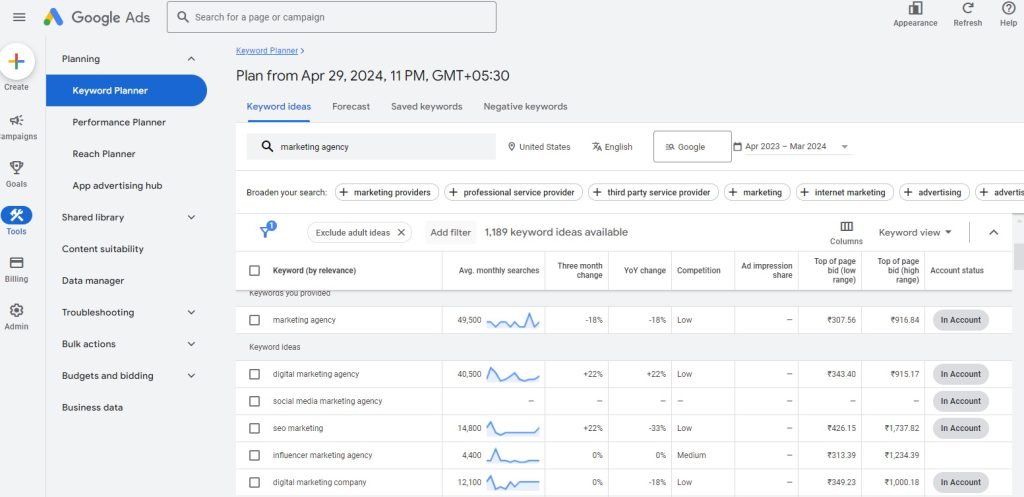
- Google Keyword Planner is a powerful tool offered by Google Ads that allows you to discover new keywords, get search volume data, and estimate the performance of keywords for your campaigns. It provides valuable insights into keyword trends, competition levels, and suggested bid prices for paid advertising.
- Example: Suppose you’re planning a digital marketing campaign for a new product launch. By using Google Keyword Planner, you can research relevant keywords related to your product, such as product features, benefits, and industry-specific terms. You can then analyze the search volume and competition for these keywords to inform your campaign strategy.
SERP Gap Analyzer:
- The SERP (Search Engine Results Page) Gap Analyzer tool helps you identify keyword opportunities by comparing your website’s keywords with those of your competitors. It allows you to analyze the keywords your competitors are ranking for but you’re not, enabling you to fill gaps in your content strategy and improve your search visibility.

- Example: Let’s say you run an e-commerce website selling fitness equipment. By using the SERP Gap Analyzer tool, you can compare your keyword rankings with those of your top competitors. If you discover that your competitors are ranking for keywords like “best home gym equipment” or “fitness gear reviews,” you can prioritize creating content around these keywords to compete more effectively in the SERPs.
Google Search Console:
- Google Search Console is a free tool provided by Google that allows website owners to monitor and optimize their site’s performance in Google Search results. It provides valuable data on search queries, click-through rates, impressions, and more, helping you understand how your site appears in Google’s search results and identify opportunities for improvement.
- Example: By analyzing the search queries report in Google Search Console, you can identify which keywords are driving traffic to your website and how your site is performing for those queries. For example, if you notice that your site is ranking well for informational queries related to fitness equipment but not for transactional keywords like “buy home gym equipment,” you can adjust your content and optimization strategies to better target commercial intent keywords and drive sales.
Other Recommended Tools (Contd.):
- Semrush: Semrush is a comprehensive SEO toolkit that offers a wide range of features for keyword research, competitive analysis, site audits, and more. It provides insights into organic and paid search data, backlink profiles, and keyword difficulty, allowing you to identify lucrative keyword opportunities and monitor your competitors’ strategies.
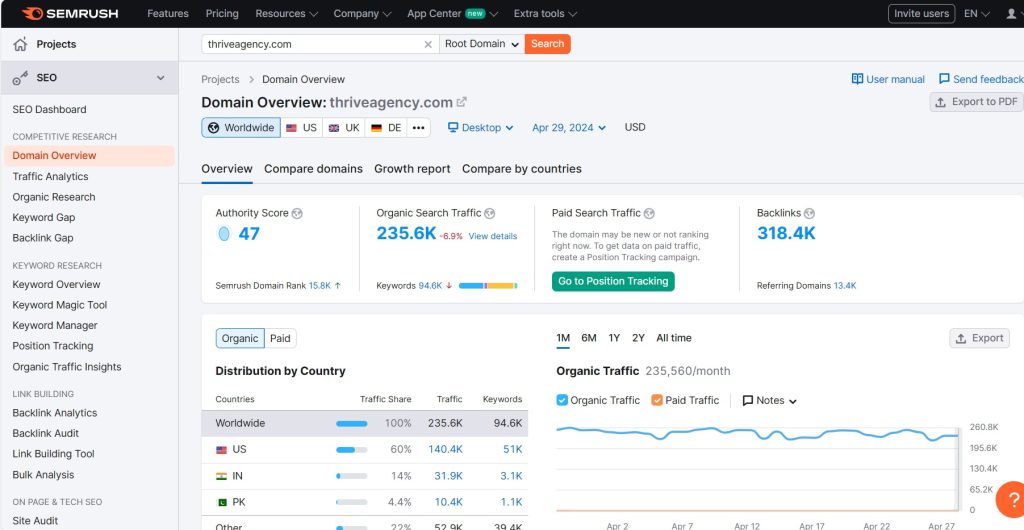
- Example: Let’s say you’re launching a new digital marketing campaign and want to assess the competitive landscape in your industry. By using Semrush’s Keyword Magic Tool, you can discover long-tail keywords with high search volumes and low competition. You can also analyze your competitors’ top-performing keywords and ad copy to inform your campaign strategy and gain a competitive edge.
- Ahrefs: Ahrefs is another robust SEO toolset that offers features for keyword research, backlink analysis, content exploration, and rank tracking. It provides valuable insights into keyword difficulty, search volume, and SERP features, helping you identify profitable keywords and optimize your content for better rankings.
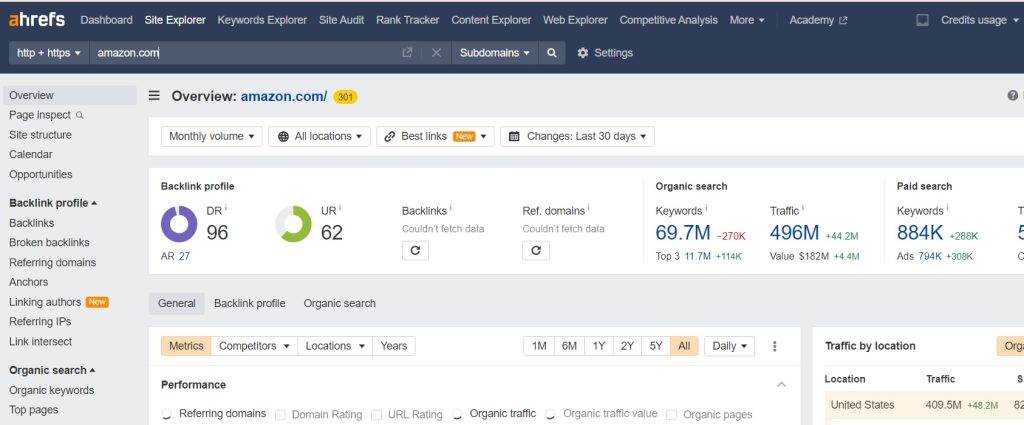
- Example: Suppose you’re optimizing your website for local search and want to identify keywords with high local search intent. With Ahrefs’ Keyword Explorer, you can filter keywords by location and assess their search volume and difficulty in specific regions. This allows you to tailor your content to local audiences and improve your visibility in local search results.
- Moz Keyword Explorer: Moz Keyword Explorer is a user-friendly tool that provides insights into keyword difficulty, search volume, and organic click-through rates. It offers features for keyword research, SERP analysis, and competitive intelligence, enabling you to identify high-potential keywords and track your progress over time.
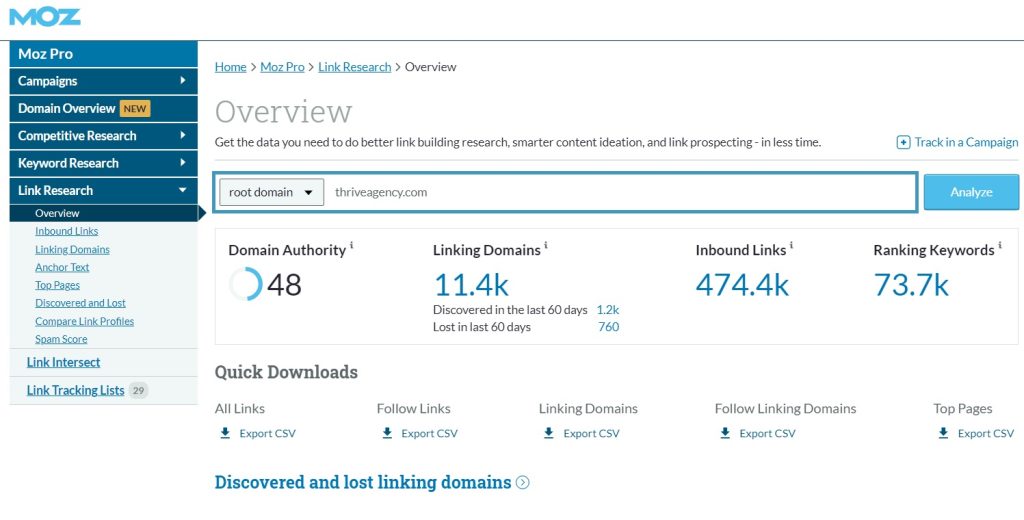
- Example: Let’s say you’re optimizing your blog content for SEO and want to find relevant keywords with low difficulty and high search volume. By using Moz Keyword Explorer, you can discover long-tail keywords with high click-through rates and incorporate them into your content strategy. You can also track your keyword rankings and monitor your site’s performance in search results.
- Keyword Surfer: Keyword Surfer is a browser extension that provides instant keyword insights directly within Google search results. It offers data on search volume, related keywords, and domain authority, allowing you to conduct keyword research on the fly and identify relevant topics for content creation.
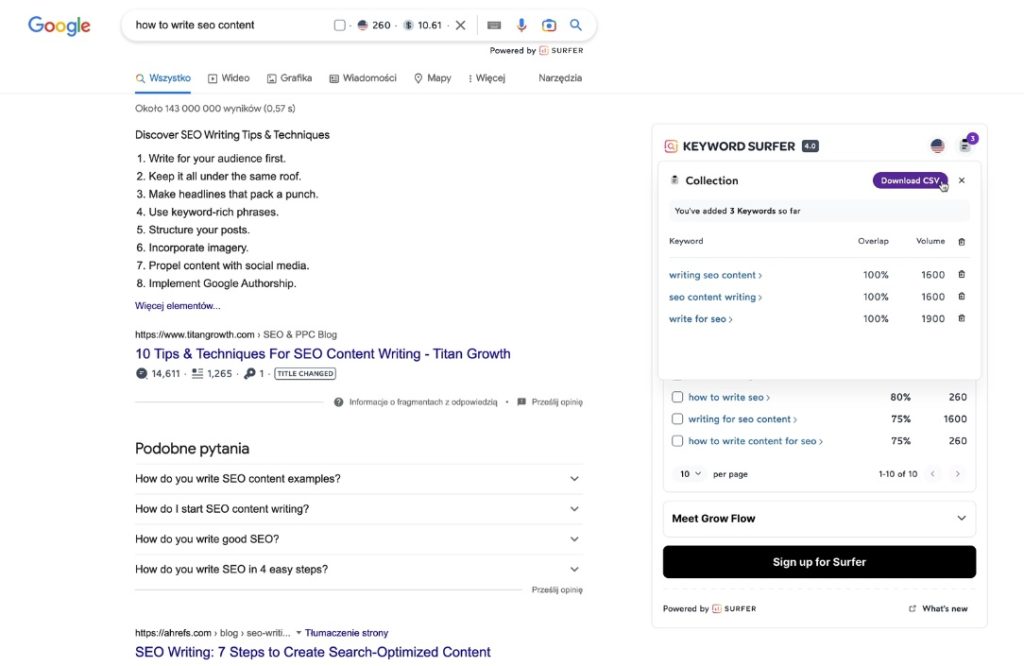
- Example: Imagine you’re conducting research for a blog post on digital marketing trends. With Keyword Surfer, you can enter relevant seed keywords into Google search and instantly view search volume data, related queries, and top-ranking pages. This real-time data helps you identify trending topics and optimize your content for maximum visibility.
By leveraging these essential keyword research tools, you can gain valuable insights into search trends, competitor strategies, and audience preferences, enabling you to optimize your content effectively and achieve better rankings in search results. Whether you’re a seasoned SEO professional or a novice marketer, incorporating these tools into your workflow can help you stay ahead of the curve and drive organic traffic to your website.
8. Tracking and Improving Keyword Performance:
1. Utilizing Rank Tracking Tools:
- Rank tracking tools allow you to monitor the performance of your keywords in search engine results pages (SERPs) over time. These tools provide valuable insights into your keyword rankings, visibility, and organic traffic, helping you track your SEO progress and identify areas for improvement.
- Example: Tools like Semrush’s Position Tracking feature enable you to monitor your keyword rankings across multiple search engines and geographic locations. You can track changes in your rankings, compare your performance to competitors, and receive alerts for significant rank fluctuations, allowing you to take proactive measures to maintain or improve your positions in SERPs.
2. Monitoring Keyword Performance Metrics:
- Monitoring keyword performance metrics involves tracking various indicators to assess the effectiveness of your SEO efforts and identify opportunities for optimization. These metrics may include search volume, click-through rate (CTR), organic traffic, conversion rate, and more, providing valuable insights into the impact of your keyword targeting strategies.
- Example: Using Google Analytics, you can track the organic search traffic generated by specific keywords and assess their contribution to your overall website traffic and conversions. By analyzing metrics such as bounce rate, time on page, and goal completions for each keyword, you can determine which keywords drive the most valuable traffic and prioritize them in your SEO strategy.
3. Analyzing Search Volume Trends:
- Search volume trends reflect the popularity and demand for specific keywords over time. By monitoring search volume trends, you can identify seasonal fluctuations, emerging trends, and shifts in user behavior, allowing you to adjust your keyword targeting strategies accordingly.
- Example: Suppose you’re optimizing your e-commerce website for holiday sales and want to identify high-demand keywords during the holiday season. By analyzing search volume trends using tools like Google Trends or Semrush’s Keyword Overview, you can identify trending keywords related to holiday gifts, promotions, and discounts. This insight can help you tailor your content and marketing campaigns to capitalize on seasonal opportunities and drive more traffic to your website.
4. Tracking Click-Through Rates (CTR):
- Click-through rate (CTR) measures the percentage of users who click on your website’s link in search engine results pages (SERPs) after searching for a specific keyword. By tracking CTR for your targeted keywords, you can assess the effectiveness of your title tags, meta descriptions, and search snippets in attracting clicks and driving organic traffic.
- Example: Using tools like Google Search Console or Semrush’s Organic Research feature, you can track the CTR for individual keywords and identify opportunities to improve your search snippets. By experimenting with different title tags and meta descriptions, optimizing your content for featured snippets, and addressing user intent more effectively, you can increase your CTR and drive more qualified traffic to your website.
5. Monitoring Organic Traffic and Conversions:
- Organic traffic and conversions represent the number of visitors who land on your website through organic search results and take desired actions, such as making a purchase, signing up for a newsletter, or filling out a contact form. By monitoring these metrics for your targeted keywords, you can assess the overall performance of your SEO efforts and measure their impact on your business goals.
- Example: Using tools like Google Analytics or Semrush’s Traffic Analytics feature, you can track the organic traffic generated by specific keywords and analyze their contribution to your website’s conversions and revenue. By identifying high-converting keywords and optimizing your landing pages for user engagement and conversion, you can maximize the return on investment (ROI) of your SEO campaigns and drive sustainable business growth.
6. Implementing Keyword Optimization Strategies:
- Keyword optimization involves refining your website’s content, meta tags, and internal linking structure to improve its relevance and visibility for targeted keywords. By implementing on-page and off-page optimization techniques, you can enhance your website’s search engine rankings and attract more organic traffic from relevant search queries.
- Example: You can optimize your website’s meta tags (title tags, meta descriptions, and header tags) to include your targeted keywords and compelling calls-to-action that encourage users to click through to your site. Additionally, you can create high-quality, keyword-rich content that addresses user intent, provides valuable information, and satisfies search queries effectively. By optimizing your website for relevant keywords and user experience, you can improve its visibility in search results and drive more qualified traffic and conversions.
By leveraging these tracking and optimization strategies, you can monitor the performance of your targeted keywords, identify opportunities for improvement, and optimize your SEO efforts to achieve better rankings, visibility, and traffic. Continuously monitoring keyword performance metrics and adjusting your strategy based on data-driven insights will help you stay ahead of the competition and achieve your business objectives in the ever-evolving landscape of search engine optimization.
9. Unlocking the Power of Additional Resources in Keyword Research
In the realm of keyword research, having access to a diverse range of related articles, tools, and resources can significantly enhance your strategy’s effectiveness and efficiency. These additional resources serve as valuable aids in gaining deeper insights, refining your approach, and staying updated with the latest industry trends. Let’s explore how you can leverage these resources to elevate your keyword research game and achieve optimal results.
1. Related Articles and Resources:
One of the most valuable resources for expanding your knowledge and understanding of keyword research is related articles and resources from reputable sources. These articles often provide in-depth analyses, case studies, and practical tips for conducting effective keyword research, enabling you to learn from experts in the field and apply their insights to your own strategy.
By reading related articles, you can gain valuable insights into emerging trends, best practices, and innovative techniques in keyword research. Additionally, these resources may offer step-by-step guides, tutorials, and actionable advice for optimizing your keyword strategy and maximizing its impact on your SEO efforts.
2. Tips for Effective Keyword Research:
Effective keyword research is essential for driving targeted traffic to your website, increasing your visibility in search engine results pages (SERPs), and ultimately, achieving your business goals. To help you conduct keyword research more efficiently and strategically, here are some tips to consider:
- Start with a clear understanding of your target audience and their search behavior. Identify the keywords and phrases they’re likely to use when searching for products or services related to your business.
- Use a combination of keyword research tools to gather comprehensive data and insights. Platforms like Google Keyword Planner, SEMrush, Ahrefs, and Moz offer valuable features for analyzing search volume, competition, and keyword trends.
- Prioritize long-tail keywords, which are longer and more specific phrases that typically have lower competition and higher conversion rates. These keywords can help you attract highly targeted traffic and improve your chances of ranking higher in SERPs.
- Analyze your competitors’ keywords to identify gaps and opportunities in your own strategy. Look for keywords that they’re ranking for but you’re not, and consider targeting those keywords to capture additional traffic and market share.
- Regularly monitor and evaluate your keyword performance metrics, such as search rankings, organic traffic, and click-through rates (CTR). Use this data to refine your keyword strategy, optimize your content, and capitalize on emerging trends and opportunities.
To Summarize:
By incorporating these tips into your keyword research process, you can enhance the effectiveness and efficiency of your SEO strategy, drive more qualified traffic to your website, and achieve better results in the competitive online landscape
Keyword research is a fundamental aspect of any successful SEO strategy, providing businesses with valuable insights into their target audience’s search behavior and preferences. At its core, keyword research involves identifying and analyzing the terms and phrases that users input into search engines. This process goes beyond mere selection of keywords; it delves deep into understanding user search behavior, trends, and industry-specific terminology.
For Dmezi, a digital marketing agency, keyword research is crucial for guiding their clients’ digital objectives and enhancing online visibility. By unraveling the intricacies of keyword research, dmezi can tailor their clients’ content and digital marketing efforts to align with user intent effectively. This process involves several key steps:
- Brainstorming “Seed” Keywords: Start by identifying core themes, topics, and concepts relevant to the client’s business or industry. These initial keywords serve as the foundation for further exploration and refinement.
- Analyzing Competitor Keywords: Gain insights into competitors’ keyword strategies to identify gaps and opportunities in the market.
- Utilizing Keyword Research Tools: Leverage sophisticated tools like SEMrush, Google Keyword Planner, and Ahrefs Keyword Explorer to expedite the keyword research process and uncover hidden opportunities.
- Exploring Niche-Specific Keywords: In addition to broad industry keywords, explore niche-specific keywords that cater to specific segments of the target audience.
- Analyzing Keywords: Understand search volume, traffic potential, keyword difficulty, and cost per click to prioritize keyword targeting efforts effectively.
- Targeting Keywords: Identify parent topics, analyze search intent, and utilize keyword research tools to develop a robust keyword strategy aligned with the client’s goals.
- Prioritizing Keywords: Focus on low-hanging fruit keywords, assess business potential, and establish priority keywords based on strategic importance and impact.
- Advanced Keyword Research Tips: Incorporate semantic keywords, anticipate keyword trends, and explore additional resources to enhance the effectiveness of keyword research efforts.
By following a systematic approach to keyword research, dmezi can unlock untapped opportunities, drive organic traffic, and achieve sustainable growth for their clients in the competitive online ecosystem.










